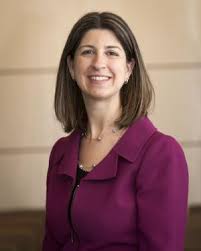Written by Meredith Englander Polsky, co-founder of Matan and Director of Training and Advocacy, this post originally appeared on The Jewish Week’s blog, The New Normal (April 15, 2013).
When my first child was born, we joined a Baby and Me group at our local Jewish  Community Center.
Community Center.
There was one woman in our group who had twins. I was having a hard enough time being a first-time mom to one, and I would look at her sitting on the floor across the circle from me with her twins, and I would think – in that illogical part of my brain –that she’d had some kind of extra training in order to have twins. That she was different from me.
Of course that’s ridiculous, I know – in the same way that it would be ridiculous to think that parents of children with special needs received a parenting manual that the rest of us didn’t. It’s sometimes an easy out to think in terms of “them” and “us” – they have a child with special needs, and we don’t. “We” navigate our parenting world and “they” navigate theirs. But things can change on a dime, and those lines can quickly become intertwined. “We” might need “them” in ways that we hadn’t expected; “they” might not be available to “us” because the lines have been drawn so deeply.
In a post on this blog last week, special education advocate/attorney Regina Skyer discussed the legal obligation of religious institutions to include children with special needs. The short answer is, no, they don’t have a legal obligation. But do they have a moral one?
Our tradition provides no shortage of proof that the Jewish community is meant to be inclusive of all kinds of learners. “Educate each child according to his way” – Proverbs, 22:6; “Every member of the people of Israel is obligated to study Torah – whether one is rich or poor, physically able or with physical disability” – Maimonides, Mishne Torah, chapter 10; “For My house shall be a house of prayer for all people” – Isaiah, 56:5. The list goes on and on but the short answer is, yes, we have a moral obligation to make sure Jewish education is accessible to all learners.
Jewish communities that are inclusive have the potential to blur the lines between “us” and “them.” In so doing, those communities will learn first-hand what researchers have been telling us for decades: inclusive learning environments benefit everyone. Typically developing peers develop a deep respect for differences among individuals, along with an increased capacity for empathy and for feeling empowered that they can make a difference in this world; teachers learn how to recognize individual strengths, to work collaboratively with one another, and acquire different ways of solving problems and creatively addressing challenges; adult members of the community promote the civil rights of all individuals and show their children the value of equality, building supportiveness and interdependence.
For all of these reasons, and so many more, our Jewish communities are truly only as strong as their ability to include all learners. After all, would you rather be part of a community that is legally exonerated from basic civil rights, or one that meets its moral mandate for “us,” “them” and everyone in between.
